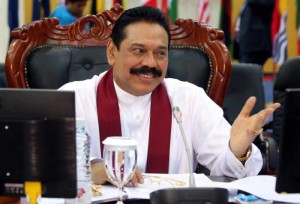
Under pressure to allow an international probe, Sri Lankan President Mahinda Rajapaksa said Wednesday that “human rights are used as a tool to implement motivated agendas” and criticised what he characterised as double standards in enforcing them.
Speaking at the UN General Assembly, Rajapaksa said: “Human rights should be recognised by all as a moral and ethical concept rather than as a political tool.” He warned that “external intervention without adequate consideration of the structures in a society and cultural traditions” leads to destabilisation.
In March the UN Human Rights Council mandated a probe into “alleged serious violations and abuses of human rights and related crimes by both parties in Sri Lanka.” The United States spearheaded the resolution for the international investigation, while India abstained.
Calling his nation ” an unfortunate victim of ill-conceived agendas of some in the Human Rights Council,” Rajapaksa said, “There is an obvious lack of balance and proportion in the manner in which my country is being targeted today, disregarding these significant achievements. This is in sharp contrast with the approach to deeply disturbing situations involving humanitarian emergencies elsewhere.”
After the civil war, Sri Lanka has made substantial progress in reconciliation, he said. “Large scale post conflict reconstruction, rehabilitation and resettlement initiatives were implemented in the North in a relatively short period of four years. Most importantly, democratic structures in the North have been re-established. Elections were held to the Northern Provincial Council in September 2013, after a lapse of 28 years.”
A recurring theme in Rajapaksa’s speech was that nations like his were being bullied by international organizations in various ways. “UN bodies must find ways to work with governments through dialogue, greater understanding of situations and cooperation including assistance to strengthen national institutions. This approach, instead of strong arm tactics, must form the heart of multilateral diplomacy, in the search for sustainable solutions to global challenges.”